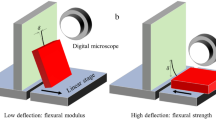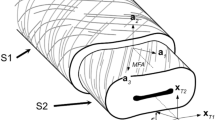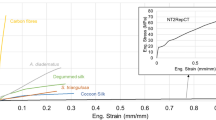Abstract
SINGLE carbon fibres 25 cm long have been strained at a rate of 0.1 cm/h and their electrical resistance monitored continuously. Three different grades of fibre, each from a different source, have been studied (Table 1); values of Young's modulus were determined from tensile tests on individual fibres. The electrical resistance of the unstrained fibres varied from fibre to fibre even among fibres of the same grade. The variations within the grades appeared to be due to variations in the diameter of the fibres; mean values of resistance and diameter are given in Table 1.
This is a preview of subscription content, access via your institution
Access options
Subscribe to this journal
Receive 51 print issues and online access
$199.00 per year
only $3.90 per issue
Buy this article
- Purchase on Springer Link
- Instant access to full article PDF
Prices may be subject to local taxes which are calculated during checkout
Similar content being viewed by others
References
Watt, W., Philips, L. N., Johnson, W., The Engineer, 221, 815 (1966).
Watt, W., and Johnson, W., Nature, 215, 384 (1967).
Bacon, G., J. App. Chem., 6, 477 (1956).
Curtis, G. J., Milne, J. M., and Reynolds, W. N., Nature, 220, 1024 (1968).
Author information
Authors and Affiliations
Rights and permissions
About this article
Cite this article
CONOR, P., OWSTON, C. Electrical Resistance of Single Carbon Fibres. Nature 223, 1146–1147 (1969). https://doi.org/10.1038/2231146b0
Received:
Issue Date:
DOI: https://doi.org/10.1038/2231146b0
This article is cited by
-
Research on piezoresistive effect and random model of carbon fiber bundle
Archives of Civil and Mechanical Engineering (2023)
-
Second- and Third-Order Elastic Constants of Filaments of HexTow® IM7 Carbon Fiber
Journal of Materials Engineering and Performance (2014)
Comments
By submitting a comment you agree to abide by our Terms and Community Guidelines. If you find something abusive or that does not comply with our terms or guidelines please flag it as inappropriate.



